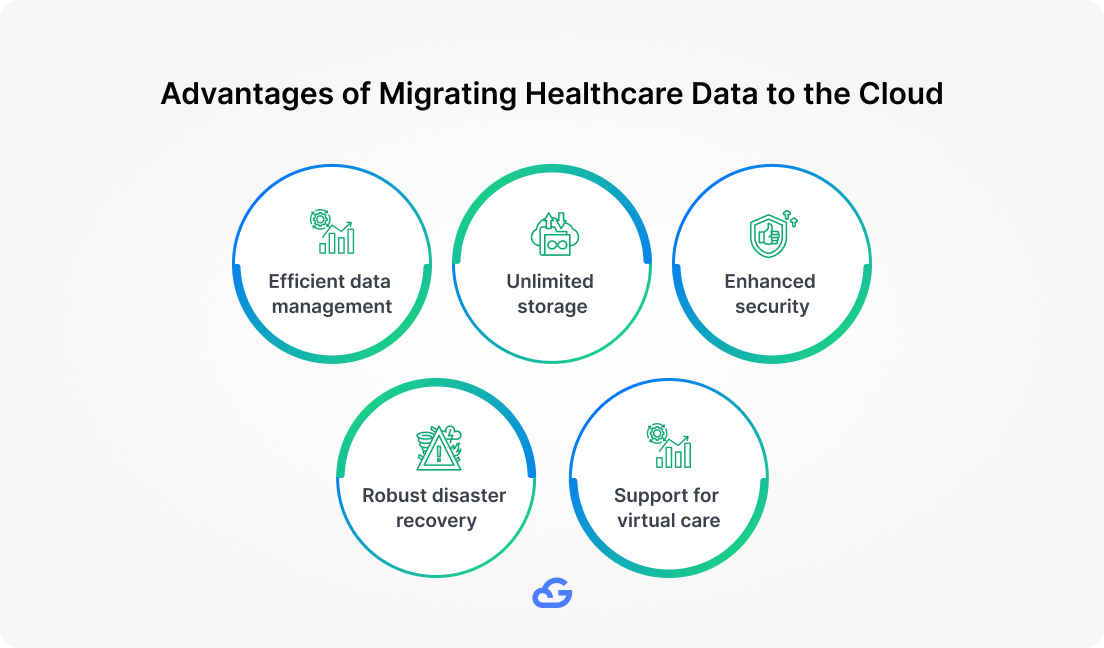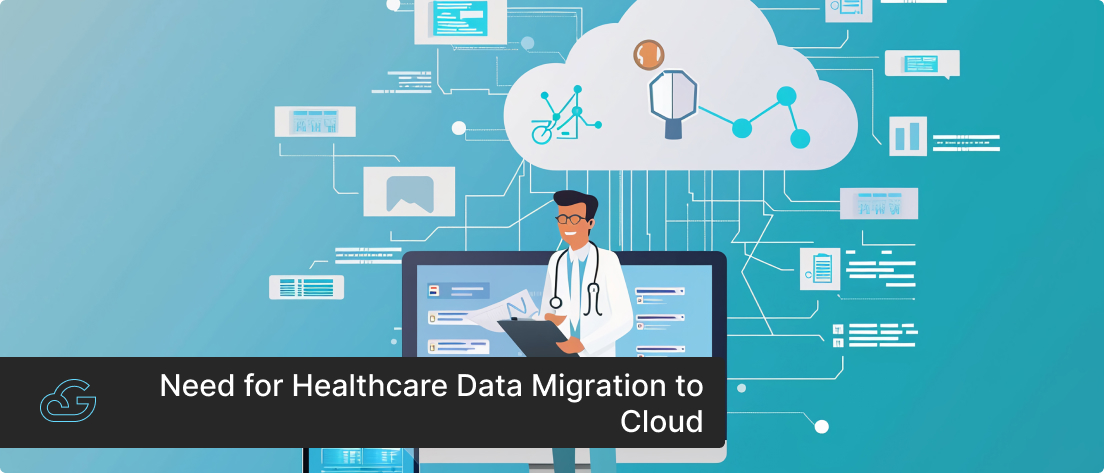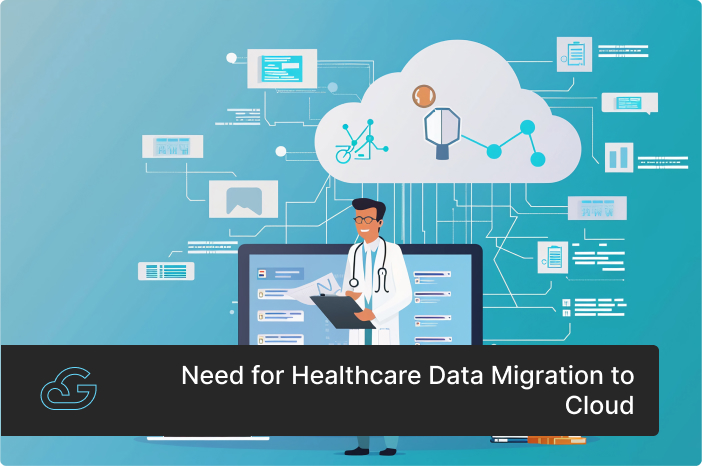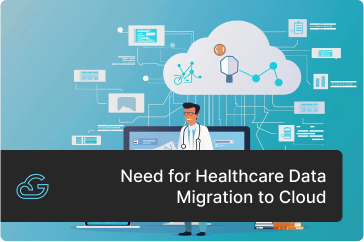Blogs / Cloud Migration
Understanding the Need for Healthcare Data Migration to Cloud
By
Sibin Vincent
Posted: Nov 19, 2024
• 7 minutes
The healthcare industry is currently experiencing a “data explosion”. Recent research indicates that the healthcare industry accounts for approximately 30% of the world's data volume, with hospitals alone generating an average of 50 petabytes of data annually. These datasets are goldmines of information that you can use to optimize your processes, functions, and systems. However, a major chunk (more than 90%) of this data goes unused.
Healthcare decision-makers can’t turn a blind eye to these huge volumes of data anymore. You must set up effective mechanisms to process, analyze, and extract valuable insights from these datasets. But doing so requires access to vast storage space, computing power, and much more, which your rigid and outdated legacy IT infrastructure simply can’t deliver. So, how can you overcome this challenge?
The answer lies in cloud technology. In this blog post, we will zoom in on why healthcare organizations need to migrate data to the cloud while exploring common challenges and key considerations. Let’s start by defining what data migration means for the healthcare industry.
What Does Data Migration Mean in Healthcare?
Data migration refers to the process of moving your datasets from one computing environment to another. This includes applications, databases, data centers, storage systems, and much more.
In a healthcare context, these datasets could contain:
- Patient’s medical records and healthcare data, including demographic and clinical information.
- Community health records with health-related information of an entire community or global population.
- Data generated from various operations or processes that power a healthcare organization.
All these datasets, if processed effectively, can provide vital insights that can help you streamline your functions and enhance patient experience. This is where cloud data migration comes into play, offering a wide range of benefits that are tailored to the healthcare sector.
Why Healthcare Organizations Should Embrace Cloud Data Migration?
There are numerous reasons why healthcare should move their data to the cloud. Let’s evaluate each one of them in detail.

-
Streamlined Data Management
In a healthcare organization, there are multiple data streams. This means it is extremely difficult to consolidate all this data and enable access to all the stakeholders involved. By migrating your data to the cloud, you are basically centralizing it to one unified database. This high level of data consolidation facilitates streamlined data management and improved collaboration, breaks down data silos, and improves interoperability between different systems and departments.
-
Unlimited Space to Store the Increasing Volume of Healthcare Data
Healthcare data is growing at an alarming rate due to the increased integration of digital touchpoints. But if you are operating with a traditional IT setup, you might soon run out of storage space, forcing you to purchase new storage servers. On the other hand, by migrating your healthcare data to the cloud, you are acquiring unlimited storage capacity, which you can scale up or down based on your needs in a cost-effective manner.
-
Improved Security & Compliance
Healthcare is a highly regulated industry, and while handling patient data, you must ensure maximum security and maintain strict compliance with all the mandates. While traditional security software applications offer a high level of protection, you will have to manually update them and install patches regularly. Additionally, compliance laws keep evolving, which again makes things tricky and tedious.
On the other hand, all the major cloud service providers offer robust security measures and come with compliance certifications (like HIPAA). This means that you don’t have to worry about data security and compliance penalties after migrating your healthcare data to the cloud.
-
Robust Disaster Recovery & Business Continuity
The COVID-19 pandemic was likely a wake-up call for your healthcare organization. There is a high chance that you may have struggled to access and update critical patient data due to limitations of your on-prem systems during lockdowns and restrictions. With cloud data migration, you can enhance your data resilience and ensure business continuity even in the event of local hardware failures or natural disasters.
When you migrate your healthcare data to the cloud:
- Your data is automatically backed up and stored in multiple geographic locations, dramatically reducing your risk of data loss.
- You can enable your authorized healthcare professionals to securely access patient information from any location, ensuring you maintain continuity of care even when physical access to your facilities is limited.
- You will be able to improve your Data Recovery Time Objectives (RTOs) and Recovery Point Objectives (RPOs), minimizing data unavailability in case of an incident.
- You gain the ability to quickly restore your critical data sets if your primary data storage is compromised.
-
Support for Remote Care & Telemedicine
Cloud data migration lays down the foundation for telemedicine initiatives and remote patient monitoring. By using cloud-based storage mechanisms to store healthcare data, you can securely access patient information from anywhere in the world. This supports futuristic healthcare delivery models like remote care and telemedicine.
Here is how cloud data migration supports remote care and telemedicine initiatives:
- Real-time data access: With your patient data in the cloud, you can gain access to the most up-to-date information instantly during virtual consultations.
- Easy data sharing: Cloud allows you to seamlessly share patient data. This is crucial for telehealth consultations involving multiple specialists or care teams.
- Enhanced mobile healthcare: Cloud data migration supports mobile healthcare applications, allowing patients to access their health records, schedule appointments, and more.
Challenges of Migrating Healthcare Data to the Cloud
Even though data migration to the cloud benefits healthcare providers, it also comes with a host of challenges. You need to understand each one and implement mechanisms to mitigate them.
- Data Compatibility: When migrating your data to the cloud, it is natural to face compatibility issues between your existing data formats and the cloud platform’s requirements. Legacy systems often use outdated or proprietary data formats that aren’t directly compatible with cloud environments. This can result in data loss, data corruption, and data misinterpretation, affecting the overall data integrity. To overcome this, you must comprehensively assess your current data formats and even factor in data normalization and conversion while designing your migration strategy.
- Downtime: Migrating large volumes of healthcare data can potentially lead to system downtime. However, in a healthcare setting where 24/7 access to patient data is critical, this is a huge problem. You must carefully plan your migration strategy with the sole aim of minimizing disruptions to your daily operations. You can opt for phased migrations, implement redundant systems during the transition, or even schedule the migration during off-peak hours. Additionally, you should also have a robust backup and rollback plan in case there are any unexpected issues during the migration process.
- Interoperability: A healthcare ecosystem comprises multiple applications and databases. All these elements should work in harmony to provide optimum output. However, during cloud data migration, ensuring interoperability between cloud-based systems and on-premises systems is a complicated task. You might face challenges in ensuring data consistency and establishing effective communication channels. To overcome these challenges, while designing your cloud data migration strategy, you must implement integration layers or APIs that will facilitate smooth data exchange.
- Lack of Strategic Planning: Healthcare data migration should be treated as a strategic process. Without a well-defined plan, you risk facing unforeseen complications, budget overruns, or failed migrations. You need to ensure that your migration plan aligns with your overall organizational goals while considering factors such as long-term scalability, compliance requirements, and future technology needs. You must also factor in training needs, process changes, and potential impacts on the workflow.
- Internal Resistance: Change can be challenging for everyone, especially for your staff, who are comfortable with existing systems and processes. This internal resistance can slow down or even disrupt your migration efforts. To address this, you need to implement a robust change management strategy that will communicate the benefits of cloud data migration. Additionally, you must design comprehensive training programs and set up a support team to help with any queries that might arise during or after the transition.
Important Steps to Consider While Migrating Healthcare Data to the Cloud
Now that we have a solid understanding of healthcare data migration and its challenges, let’s evaluate some of the important phases of this process.
- Phase 1—Planning & Assessment: During the initial phase of planning and assessment, you will estimate the data streams to be migrated while establishing the overall scope of the process. You will also have to factor in downtime and assess the cloud platforms that you have selected.
- Phase 2—Data Profiling & Cleansing: In this phase, you will classify the data generated from different sources according to its format and dependencies during the migration process. You will also have to remove duplicate data entries, corrupt data, and inconsistent data.
- Phase 3—Data Transformation & Mapping: This phase involves transforming incompatible data formats to compatible formats that match the cloud environment. Additionally, you must make sure that the source and target databases share the same schema by remapping the data structure.
- Phase 4—Data Migration & Execution: After all the planning and strategizing, the actual data migration starts in this phase. You should make sure that the process happens uninterrupted in a synchronized manner by continuously monitoring and proactively identifying and rectifying any issues or errors.
Gsoft: Your Trusted Healthcare Data Migration Partner
Healthcare data migration to the cloud can be a daunting task if you don’t have the right amount of technical knowledge. But there is no need for concern. We are Gsoft Cloud, a managed cloud service provider with proven expertise in the cloud domain and a team of cloud experts who are well-equipped to handle the intricacies of the healthcare landscape. With us by your side, you can experience a seamless data migration to the cloud.
- Industry-Specific Knowledge: Deep understanding of healthcare regulations, compliance requirements, and data security standards.
- Tailored Solutions: Customized migration strategies to meet your unique organizational needs and goals.
- End-to-End Support: Comprehensive assistance from initial planning to post-migration optimization.
- Cutting-Edge Technology: Utilization of advanced tools and methodologies for efficient and secure data migration.
- Minimal Disruption: Strategies to ensure business continuity and minimize downtime during the migration process.
- Cost-Effective Approach: Optimized migration processes to maximize ROI and minimize unnecessary expenses.
- Ongoing Support: Continued assistance and guidance post-migration to ensure smooth operations in the cloud environment.
How Does the Future of Healthcare Look with the Cloud?
Cloud computing has the potential to redefine the healthcare industry. Even though many leading organizations initially resisted the idea of this synergy, the pandemic outbreak highlighted the importance of relying on technological advancements like the cloud to improve patient outcomes and optimize daily operations.
The integration of cloud technology with healthcare is only going to accelerate rapidly in the future. We will see more sophisticated applications of artificial intelligence and machine learning powered by cloud-based data, enhancing diagnostics, delivering personalized treatment plans, and even predicting health trends.
The challenges around data security and privacy will persist. But, the benefits of cloud adoption in healthcare are becoming increasingly clear, promising a future where healthcare delivery is more accessible, efficient, and patient-centric than ever before.
Want to know more about this synergy between cloud computing and healthcare? Book a consultation today at www.gsoftcomm.net/contact-us/.


Get Know More About Our Services and Products
Reach to us if you have any queries on any of our products or Services.










